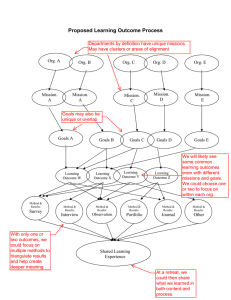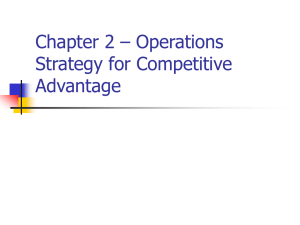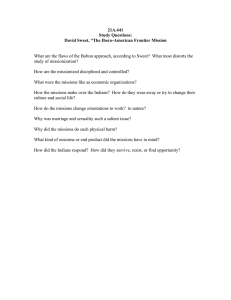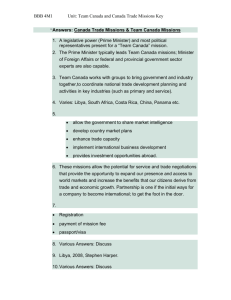Identification of domestic financial resources for sustainable development in Southern Africa
advertisement
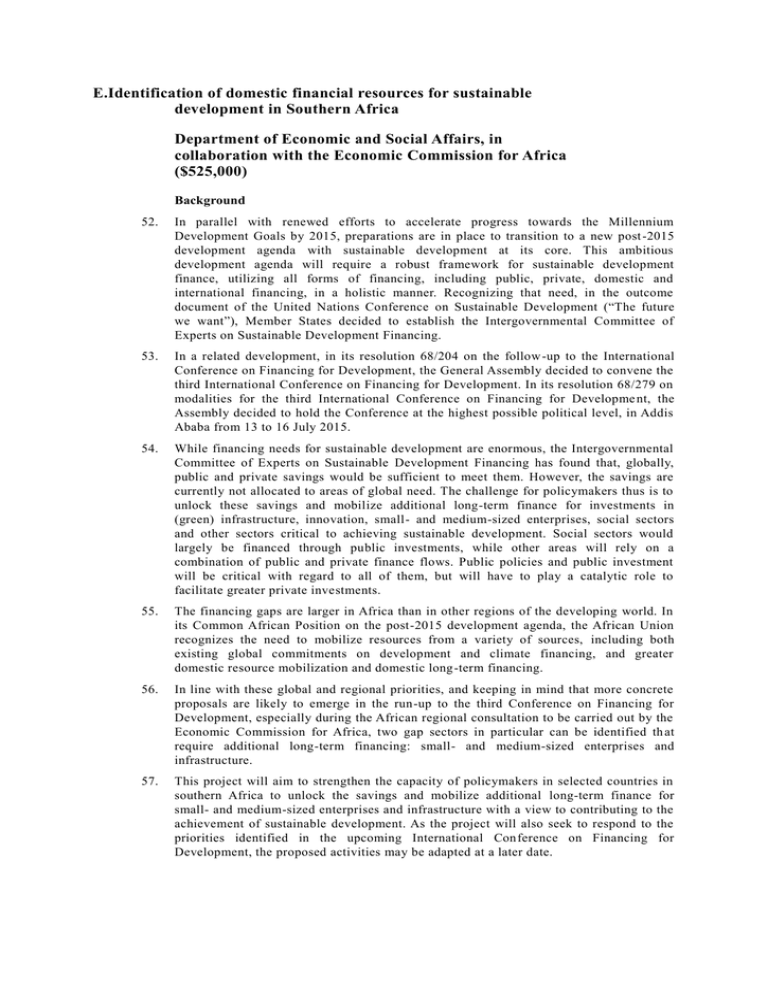
E.Identification of domestic financial resources for sustainable development in Southern Africa Department of Economic and Social Affairs, in collaboration with the Economic Commission for Africa ($525,000) Background 52. In parallel with renewed efforts to accelerate progress towards the Millennium Development Goals by 2015, preparations are in place to transition to a new post -2015 development agenda with sustainable development at its core. This ambitious development agenda will require a robust framework for sustainable development finance, utilizing all forms of financing, including public, private, domestic and international financing, in a holistic manner. Recognizing that need, in the outcome document of the United Nations Conference on Sustainable Development (“The future we want”), Member States decided to establish the Intergovernmental Committee of Experts on Sustainable Development Financing. 53. In a related development, in its resolution 68/204 on the follow -up to the International Conference on Financing for Development, the General Assembly decided to convene the third International Conference on Financing for Development. In its resolution 68/279 on modalities for the third International Conference on Financing for Developme nt, the Assembly decided to hold the Conference at the highest possible political level, in Addis Ababa from 13 to 16 July 2015. 54. While financing needs for sustainable development are enormous, the Intergovernmental Committee of Experts on Sustainable Development Financing has found that, globally, public and private savings would be sufficient to meet them. However, the savings are currently not allocated to areas of global need. The challenge for policymakers thus is to unlock these savings and mobilize additional long-term finance for investments in (green) infrastructure, innovation, small- and medium-sized enterprises, social sectors and other sectors critical to achieving sustainable development. Social sectors would largely be financed through public investments, while other areas will rely on a combination of public and private finance flows. Public policies and public investment will be critical with regard to all of them, but will have to play a catalytic role to facilitate greater private investments. 55. The financing gaps are larger in Africa than in other regions of the developing world. In its Common African Position on the post-2015 development agenda, the African Union recognizes the need to mobilize resources from a variety of sources, including both existing global commitments on development and climate financing, and greater domestic resource mobilization and domestic long-term financing. 56. In line with these global and regional priorities, and keeping in mind that more concrete proposals are likely to emerge in the run-up to the third Conference on Financing for Development, especially during the African regional consultation to be carried out by the Economic Commission for Africa, two gap sectors in particular can be identified th at require additional long-term financing: small- and medium-sized enterprises and infrastructure. 57. This project will aim to strengthen the capacity of policymakers in selected countries in southern Africa to unlock the savings and mobilize additional long-term finance for small- and medium-sized enterprises and infrastructure with a view to contributing to the achievement of sustainable development. As the project will also seek to respond to the priorities identified in the upcoming International Conference on Financing for Development, the proposed activities may be adapted at a later date. Objective of the Organization: To strengthen the capacity of the policymakers in selected countries in the Southern African region to unlock the savings and mobilize additional long-term finance for small- and medium-sized enterprises and infrastructure Relationship to the biennial programme plan for the period 2016-2017: Economic and social affairs subprogramme 9 (Financing for development); Economic and social development in Africa subprogramme 1 (Macroeconomic policy) and subprogramme 2 (Regional integration and trade) Summary budget (Thousands of United States dollars) General temporary assistance Consultants Travel Contractual services Workshops/training Total 30.0 201.0 140.0 45.0 109.0 525.0 Expected accomplishments of the Secretariat Indicators of achievement (EA1) Increased awareness and knowledge of the policymakers in selected Southern African countries about issues related to unlocking the savings and mobilizing additional long-term finance for small- and medium-sized enterprises and infrastructure (IA1.1) 75 per cent of the participants at the regional seminar acknowledge increased awareness and knowledge of means of unlocking the savings and mobilizing additional long-term finance for small- and medium-sized enterprises and infrastructure (EA2) Strengthened capacity of the policymakers in four selected countries in Southern Africa to implement instruments to unlock the savings and mobilize additional longterm finance for small- and medium-sized enterprises and infrastructure (IA2.1) Increased number of measures that have been identified and implemented in the pilot countries to apply the instruments that unlock the savings and mobilize additional long-term finance for small- and medium-sized enterprises and infrastructure (IA2.2) 75 per cent of trained participants acknowledge increased capacity to implement instruments to unlock the savings and mobilize additional long-term finance for small- and medium-sized enterprises and infrastructure Main activities 58. The main activities of the project will include: (A1.1) Development by consultant(s) of methodology/toolkits on selected topics related to unlocking the savings and mobilizing additional long-term finance for smalland medium-sized enterprises and infrastructure; (A1.2) Organization of a regional workshop/expert group meeting to discuss/validate the foregoing methodology/toolkits with international experts and exp erienced policymakers from the Southern African region; (A2.1) Development of scoping papers to assess the existing situation in four pilot countries as input to activities A2.2 and A2.3 (this will involve country missions); (A2.2) Organization of four five-day national seminars in four pilot countries focusing on addressing specific priorities and gaps of the pilot countries in the areas relevant to unlocking the savings and mobilizing additional long -term finance for small- and medium-sized enterprises and infrastructure; (A2.3) Organization of eight three-day follow-up country missions to four pilot countries with a view to providing assistance to these countries in applying the skills and knowledge acquired through the regional workshop and nationa l seminar to implement the necessary policy changes to unlock the savings and mobilize additional long-term finance for small- and medium-sized enterprises and infrastructure; (A2.4) Preparation and publication of four pilot reports; (A2.5) Organization of a regional seminar to disseminate results of the pilot studies and to encourage additional countries in the region to undertake similar measures; (A2.6) Development of online tools and/or an online platform to host activities of networks of policymakers involved in the implementation of the project (from the pilot countries and beyond). E: Identification of domestic financial resources for sustainable development in Southern Africa Duration: 2016 – 2019 Objective: To strengthen the capacity of the policy makers in selected countries in the Southern African region to unlock the savings and mobilize additional long-term finance for SMEs and infrastructure Implementing entities: DESA in collaboration with ECA Summary budget (Thousands of United States dollars) Detailed budget (US dollars) General temporary assistance Consultants Travel Contractual Services 30.0 201.0 140.0 45.0 Workshops/training 109.0 Total 525.0 General Temporary Assistance To perform the tasks of providing assistance in editing and proofreading of the toolkits/methodology, scoping papers and pilot reports, in support of activities A1.1, A2.1 and A2.4 and to provide support to organization of regional workshops in support of activities A1.2 and A2.5 (6 work months) x ($5,000 per work month) = $30,000 Consultants International consultants Activity 1.1 - development of methodology/toolkits on selected topics related to unlocking the savings and mobilizing additional long-term finance for SMEs and infrastructure, (5 work months) x ($8,000 per month) = $40,000 Activity 1.2 – travel of 6 consultants to a 3-day workshop/EGM (6 missions) = $16,500 National / Regional consultants Activity 2.1 - development of 4 country scoping papers, (12 work months) x ($4,000 per month) = $48,000 + ($19,000 for consultants travel) = $67,000 (4 ten-day missions) Activity 2.2 – travel to four 5-day national seminars = $13,000 Activity 2.3 – travel to eight 3-day follow-up country missions = $22,000 Activity 2.4 – preparation of 4 pilot reports, (8 work months) x ($4,000 per month) = $32,000 Evaluation Consultant External evaluation - $10,500 Travel of staff Staff from the implementing entity Activity 1.2 - Two missions by staff for the purpose of (facilitating a 3day regional workshop/EGM), ($6,000 average mission cost) x (2 30 000 201 000 140 000 missions) = $12,000 Activity 2.2 - 8 missions by staff for the purpose of (facilitating four 5day national seminars), ($6,250 average mission cost) x (8 missions) = $50,000 Activity 2.3 - 8 missions by UN staff for the purpose of advisory country missions, ($6,000 average mission cost) x (8 missions) = $48,000 Activity 2.5 - Two missions by staff for the purpose of (facilitating a 3day regional seminar), ($6,000 average mission cost) x (2 missions) = $12,000 Staff from other UN entities Activities 1.2, 2.2, 2.5 - 6 missions by ECA staff to provide support to activities of the project ($3,000 average mission cost) x (6 missions) = $18,000 Contractual services/grants to national partners Activity 2.4 and 2.6 - For publication of pilot studies and for development of on-line tools and/or on-line platform to host activities of networks of policy makers. ($45,000) Seminars, Workshops and Study Tours Activity 1.2 – Regional workshop/EGM, ($2,750 per participant) x (12) =$33,000 + other event costs, including conference facility, microphones, etc. ($10,000) = $43,000 Activity 2.5 – Regional workshop, ($2,800 per participant) x (20) = $56,000+ other event costs, including conference facility, microphones, etc. ($10,000) = $66,000 45 000 109 000
